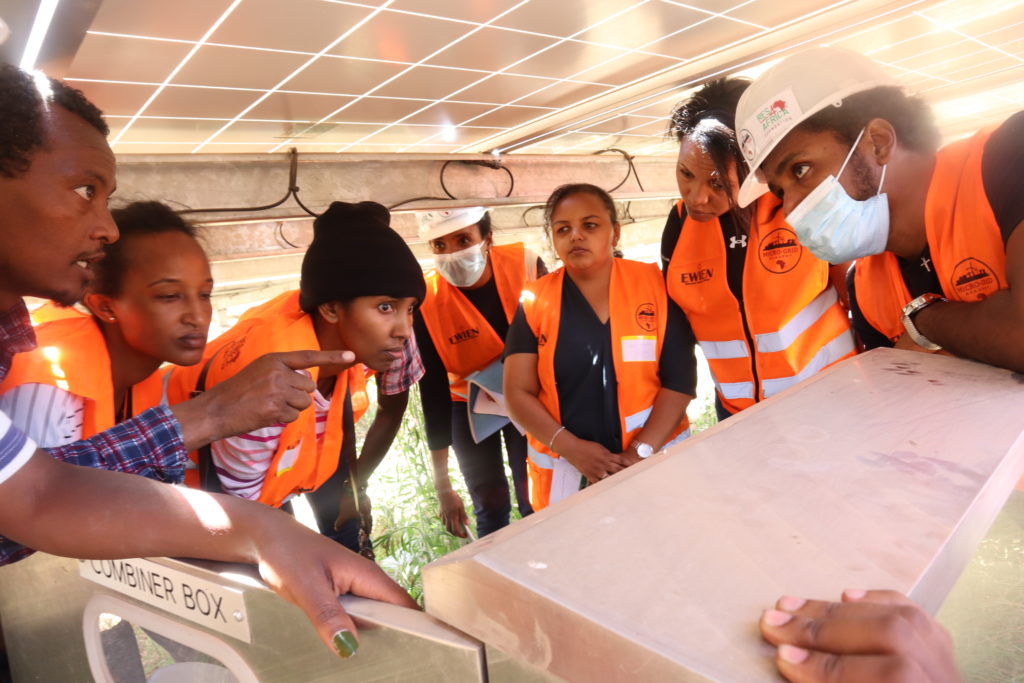Not yet all ‘sweetness and light’
Piloting solar mini-grids properly
Koftu mini-grid pilot project
BLOG
By Rekik Bekele
The system is designed to feed the following amenities within 24 hours: Planned Load
- Elementary School = 3kw
- Clinic with Refrigerator = 3kw
- Flour Mill = 3kw
- Social centers-churches = 3kw
- Farmers’ association = 3 kw
- 372 households = 100kw
- Water pumping = 36 kW
The employment opportunities that the project created: about 100 laborers, technicians, and engineers during the construction phase of the Mini-Grid, and as of 2019, three full-time EEU staff, two guards, and an operator, manage the system.
Underuse apparent
Despite the newness of the system and the impressive intricacy of its components, it was immediately apparent that the mini-grid was not being used to its full potential. For example, it was clear that the amenities listed above were not being powered as planned. I was to discover that this was due to several avoidable factors.
At the health center, the refrigerator had not even been used and the tariff meter still read zero. The flour mill was not yet working, apparently due to non-consensus among members of the cooperative. The water pump was in use, but only for drinking water; no irrigation or other productive uses. In the same way, the operator, Ebisa Gusare, who was showing us around, explained that only 169 households out of the expected 372 households were connected. Almost all of these connected houses were only using electricity to light their homes and to charge their mobile phones. Only about ten of these houses were using electricity for hot plates (Mitads in Amharic) for baking injera and bread. Why were so few houses using electricity for cooking or baking?


1) Metering, tariffs, and fear:
Although the mini-grid has been working since the year 2019/2018, at the time of writing this blog, nobody has yet been billed or charged because the Ethiopian Energy Authority (EEA) has yet to install a tariff system. As a result, residents are reluctant to use the electricity for anything other than lighting and mobile phone charging for fear of being charged a very high cumulative bill at a later date. Of course, higher daytime utilization of solar mini-grids could have led to better economic returns for the community and EEU.

(2) Lack of knowledge and thus defaulting to habits:
Residents have not been properly educated about the possibility that they could benefit from 24-hour electricity. The farmers I asked about the possibility of electric water pumps for irrigation had no idea about it. They need more help, encouragement, and first-hand demonstration of the possibilities of, say, investing in and using an efficient mitad hot plate and electric hob as an alternative to their habit of cooking over an open wood fire or buying a water pump for their cooperative.
Residents have not been properly educated about the possibility that they could benefit from 24-hour electricity. The farmers I asked about the possibility of electric water pumps for irrigation had no idea about it. They need more help, encouragement, and first-hand demonstration of the possibilities of, say, investing in and using an efficient mitad hot plate and electric hob as an alternative to their habit of cooking over an open wood fire or buying a water pump for their cooperative.
It was clear that the combination of ambiguity and perceived fear of change was scaring users to stick with their current habits when, in fact, they just needed more education and guidance about the newly expanded possibilities available to them. Although a farming area, Koftu is only 40km from Addis Ababa. Many young people move there to attend high school. The transfer of new technologies and appliances should not be difficult; users just need more help along the path.
Perhaps the most immediate and obvious disappointment about the underuse of the solar mini-grid at Koftu was one of lost potential. Unlike a hydroelectric dam storing water, solar power, like wind power, can only be stored to a certain battery capacity and must be used frequently to avoid surplus generation. The potential can not be stored indefinitely. Related to this, and very importantly, lead-acid batteries have a limited life cycle, and they will use their strength if sitting idle for long periods.
The importance of market development
Koftu has huge room for improvement and is a lesson in the importance of making full use of the money and resources invested in a mini-grid by emphasizing human resources, education, and market development aspects. If not well managed, monitored, and improved upon, a pilot can slow down progress, erode confidence, and scare away clients, investors, and the private sector.
More comprehensive market development, undertaken during the project design, site selection, implementation, and post-implementation, will improve understanding of the commercial viability of mini-grid projects. It will also inform actors about what additional interventions are needed to improve the enabling environment.
My thanks go to the Ethiopian Women in Energy Network (EWiEn), Ethiopian Electric Utility (EEU), and the Microgrid Academy team for organizing the visit to Koftu.